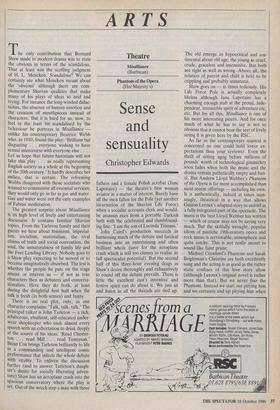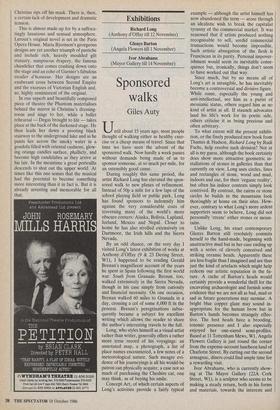ARTS
Theatre
Misalliance (Barbican) Phantom of the Opera (Her Majesty's)
Sense and sensuality
Christopher Edwards
The only contribution that Bernard Shaw made to modern drama was to state the obvious in terms of the scandalous. That at least was the scoffing judgment of H. L. Mencken. Scandalous? We can certainly see what Mencken meant about the 'obvious' although there are com- plementary Shavian qualities that make many of his plays of ideas so arid and trying. For instance the long-winded didac- ticism, the absence of human emotion and the creation of mouthpieces instead of characters. But it is hard for us, now, to feel in the least bit scandalised by the behaviour he portrays in Misalliance — unlike his contemporary Beatrice Webb who, in 1910, found the play: 'Brilliant but disgusting . . . everyone wishing to have sexual intercourse with everyone else. . . . Let us hope that future historians will not take this play . . . as really representing English society as a whole at the beginning of the 20th century.' It hardly describes her milieu, that is certain. The reforming Webbs disagreed with those socialists who wanted to communise all essential services; they would only go as far as gas and water. Gas and water were not the only examples of Fabian moderation.
. The greatest surprise about Misalliance is its high level of lively and entertaining discussion. It contains familiar Shavian topics. From the Tarleton family and their guests we hear about feminism, imperial- ism, socialism, materialism, the rival claims of truth and social convention, the soul, the unnaturalness of family life and the Free Lending Library. Nobody goes to a Shaw play expecting to be moved or to become imaginatively absorbed. The test is Whether the people he puts on the stage amuse or interest us — if not as true characters then as debaters and conversa- tionalists. Here they do both, at least during the delightful first half when the talk is fresh (in both senses) and funny.
There is no real plot, only, as one character complains: 'Talk, talk, talk.' The Principal talker is John Tarleton — a rich, adulterous, ebullient, self-educated under- wear shopkeeper who ends almost every Speech with an exhortation to drink deeply at the source of his ideas: 'Read Chester- ton . . . read Mill . . . read Tennyson.' Brian Cox brings Tarleton brilliantly to life in a commanding and intelligent comic Performance that infects the whole debate with vitality. To enliven the discussion further (and to answer Tarleton's daugh- ter's desire for socially liberating adven- ture) Shaw has an aeroplane crash into the Spacious conservatory where the play is set. Out of the wreck step a man with three fathers and a female Polish acrobat (Jane Lapotaire) — the theatre's first woman aviator as a matter of interest. Barely have all the men fallen for the Pole (yet another incarnation of the Shavian Life Force) when a socialist accounts clerk and would- be assassin rises from a portable Turkish bath with the celebrated and dumbfound- ing line: 'lam the son of Lucinda Titmuss.' John Caird's production succeeds , in harnessing much of the debate and farcical business into an entertaining and often brilliant whole (save for the aeroplane crash which is still too clumsy to realise its full spectacular potential). But the second half of this three-hour evening drags as Shaw's desire thoroughly and exhaustively to round off the debate prevails. There is little the excellent cast's inventive and festive spirit can do about it. We just sit and listen as all the threads are tied up. The old emerge as hypocritical and sen- timental about old age; the young as cruel, crude, graceless and insensitive. But both are right as well as wrong. Above all, the relation of parent and child is held to be crippling and probably unnatural.
Shaw goes on — at times tediously. His Life Force Pole is actually completely lifeless although Jane Lapotaire has a charming enough stab at the proud, inde- pendent, irresistible spirit of adventure etc, etc. But for all this, Misalliance is one of his more interesting pieces. And for once much of what he has to say is not so obvious that it cannot bear the sort of lively airing it is given here by the RSC.
As far as the contemporary musical is concerned no one could hold lower ex- pectations than your reviewer. Even the thrill of sitting agog before millions of pounds' worth of technological gimmickry soon fades when both the music and the drama remain pathetically empty and ban- al. But Andrew Lloyd Webber's Phantom of the Opera is far more accomplished than most recent offerings — including his own. It is authentically, indeed at times stun- ningly, theatrical in a way that allows Gaston Leroux's adapted story to unfold as a fully integrated part of the spectacle. The music is the best Lloyd Webber has written — which of course may not be saying very much. But the skilfully wrought, popular idiom of pastiche 19th-century opera and rock music is serviceable, atmospheric and quite catchy. This is not really meant to sound like faint praise.
Michael Crawford's Phantom and Sarah Brightman's Christine are both excellently sung and the acting is as good as the rather static confines of this love story allow (although Leroux's original novel is rather more than that). But we never fear the Phantom. Instead we start out pitying him and we certainly end up pitying him when Christine rips off his mask. There is, then, a certain lack of development and dramatic tension.
This is almost made up for by a suffoca- tingly luxurious and sensual atmosphere. Leroux's original novel is set in the Paris Opera House. Maria Bjornson's georgeous designs are Yet another triumph of pastiche and include rich, heavily moulded gilt statuary, sumptuous drapery, the famous chandelier that comes crashing down onto the stage and an echo of Garnier's fabulous escalier d'honneur. Her designs are an exuberant cross between Second Empire and the excesses of Victorian English and, so, highly reminiscent of the original.
In one superb and beautifully composed piece of theatre the Phantom materialises behind the mirror in Christine's dressing- room and sings to her, while a ballet rehearsal — Degas brought to life — takes place at the back of the darkened stage. He then leads her down a pivoting black stairway to the underground lake and as he punts her across the smoky water in a gondola filled with oriental cushions, glow- ing orange candles surface, phallicly, and become high candelabra as they arrive at his lair. In the meantime a great portcullis descends to shut out the upper world. At times like this one senses that the musical had the potential to become something more interesting than it in fact is. But it is already arresting and memorable for all that.



















































 Previous page
Previous page